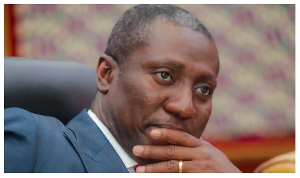Accra, Oct. 14, GNA - The Social Security and National Insurance Trust (SSNIT) has introduced a special scheme for informal sector workers to improve the coverage of the Trust, currently less than 10 per cent of the working population.
Mr Kwasi Osei, Director-General of the SSNIT, said the informal sector constituted a large population of workers who were not covered by any formal protection and a target market for the Trust to expand the protection it offered.
Mr Osei said this in Accra at a lecture on the theme, "Pensions in Ghana- the Way Forward", organised by the Actuarial Society of Ghana, as part of its continuing public education programme.
Comparing benefits the CAP 30 Scheme to the SSNIT Scheme, which became a bone of contention leading to industrial actions in 2004, Mr Osei reiterated that the SSNIT Scheme was supposed to be the basic scheme that covered all workers of the country.
He, however, maintained that the two were complementary rather than competitive, and called for the standardisation of pension schemes in the country.
Mr Osei said other occupational schemes, such as the Universities Superannuation Scheme, were to complement the basic scheme provided by the SSNIT.
Dr Albert Gemegah of the University of Ghana Business School said pension schemes were designed to handle identifiable risks the retired worker was exposed to.
These include individual risks like unemployment, poor health and changes in consumption needs; employer, investment and national risks, and international risk like global weather shifts, environmental pollution, international epidemics and wide scale conflicts. Sourcing data from the SSNIT Corporate Website, Dr Gemegah said SSNIT, the largest body in the pensions industry in Ghana, was reported to have collected contributions totalling about 1.38 trillion cedis in 2003, and as of March 2003, the SSNIT had a total of 62,007 pensioners to cater for.
The total value of claims made amounted to 81.4 billion cedis. As at March 2004, there were 1,012,119 active contributors to the Scheme. Dr Gemegah said specific challenges faced by the scheme included the existence of a formal economy alongside an informal one, where the informal economy poses difficulties for the accessibility and management of the scheme. There is also the relatively weak capacity of the economy to absorb excess labour, low wages particularly in the public sector, ageing contributors, a worsening high dependency ratio and an inability to provide adequate pensions to retirees.
Other major problems of the scheme are lack of innovative products for the informal sector, inadequacy of paid benefits, a weak influence of the Scheme owners on its operation and an excessive influence of Government.
Dr Gemegah made reference to the three-tier pension scheme proposed by the Presidential Commission on Pensions in its interim report - the mandatory SSNIT scheme, the mandatory occupational pension scheme and a third voluntary personal scheme.
He said there was an urgent need to raise the level of security (life assurances) consciousness of the population.
"It is a sad fact that we have become more interested in making instant gains, for example, through lotteries than making long term plans for our future security."
Click to view details



Business News of Friday, 14 October 2005
Source: GNA
















